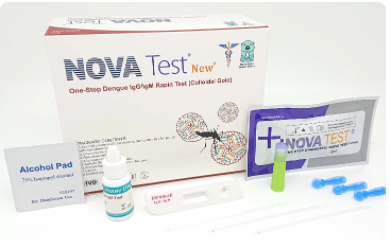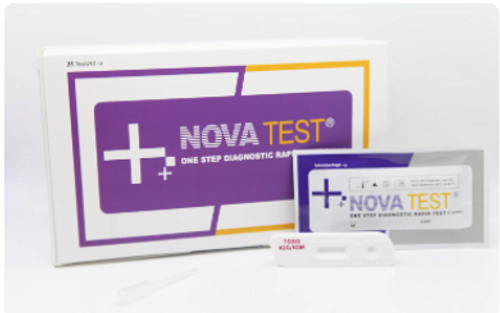Product Description
Expected use
The Dengue IgG / IgM Rapid Test is a solid-phase immunochromatographic assay for the rapid, qualitative, and differential detection of IgG and IgM antibodies to Dengue virus in human serum, plasma, or whole blood. This test is intended for professional use to aid in the presumptive diagnosis between primary and secondary dengue infection. This test provides only a preliminary test result. Therefore, virus isolation, antigen detection in fixed tissues, RT-PCR and serological test as a hemagglutination inhibition test, a more specific alternative diagnostic method should be used to obtain a confirmation of infection by the virus of the dengue.
Summary and explanation
Dengue viruses, transmitted by the Aedes aegypti and Aedes albopictus mosquitoes, are widely distributed throughout the tropical and subtropical areas of the world. There are four different known serotypes (dengue virus 1, 2, 3, and 4). In children, the infection is usually subclinical or causes a self-limited febrile illness. However, if the patient is infected a second time with a different serotype, a more serious illness, dengue hemorrhagic fever or dengue shock syndrome is more likely to occur. Dengue is considered to be the most important arthropod-borne viral disease due to the human morbidity and mortality it causes. Traditionally, the serologic diagnosis of an acute dengue virus infection has been based on showing a 4-fold or greater increase in dengue virus antibodies between paired acute and convalescent sera from a patient.
The hemagglutination inhibition test has been the most widely used serological test for the diagnosis of dengue. Rapid and reliable tests for primary and secondary dengue infections are essential for patient management. Primary dengue infection is associated with mild to high fever, headache, muscle pain, and rash. The immune response includes IgM antibodies produced by the fifth day of symptoms and persists for 30 to 60 days. IgG appear on day 14 and persist for life. Secondary infections often cause a high fever and, in many cases, bleeding episodes and circulatory failure. Secondary infections show that IgG increases between 1 and 2 days after the onset of symptoms and induces an IgM response after 20 days of infection.







